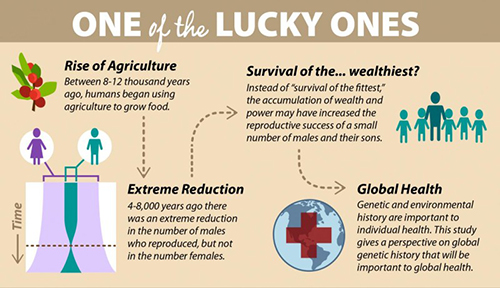Four to eight thousand years ago, when people settled down and started farming, they probably had no idea they were about to write a new chapter in genetic history. Cultural history, yes. That was probably fairly obvious, what with all the security and prosperity that started to emerge. But as material wealth grew, another kind of wealth—genetic diversity—was diminishing. At least, it was diminishing among males.
That’s the conclusion of a study led by scientists from Arizona State University (ASU), the University of Cambridge, the University of Tartu, and the Estonian Biocentre. These scientists discovered a dramatic decline in genetic diversity in male lineages that occurred during the mid- to late-Neolithic period. This male-specific genetic bottleneck coincided with the accumulation of material wealth, and it was not accompanied by any similar decline among females. In fact, during this time, female genetic diversity was on the rise.
Melissa Wilson Sayres, an assistant professor with ASU's School of Life Sciences, said, “Instead of ‘survival of the fittest’ in biological sense, the accumulation of wealth and power may have increased the reproductive success of a limited number of ‘socially fit’ males and their sons.”
The male-specific, Neolithic decline in genetic diversity is not the first genetic bottleneck that has been uncovered. An earlier bottleneck occurred approximately 50,000 years ago when a subset of humans left Africa and migrated across the rest of the world. Signatures of this bottleneck appear in most genes of non-African populations, whether they are inherited from both parents or, as confirmed in the current study, only along the father’s or mother’s genetic lines.
The study was described March 13 in the journal Genome Research, in an article entitled, “A recent bottleneck of Y chromosome diversity coincides with a global change in culture.” The article explains how the researchers analyzed DNA samples by means of computer and statistical modeling to detect both genetic bottlenecks.
“We … detect a cluster of major non-African founder haplogroups in a narrow time interval at 47–52 kya, consistent with a rapid initial colonization model of Eurasia and Oceania after the out-of-Africa bottleneck,” wrote the authors. “In contrast to demographic reconstructions based on mtDNA, we infer a second strong bottleneck in Y-chromosome lineages dating to the last 10 ky.”
The researchers started with DNA samples taken from the saliva or blood of 456 males living in seven regions of five continents including Africa, the Andes, South-Asia, near East and Central Asia, Europe and Oceania. Then they specifically studied the Y chromosome, which is passed down through the male lineage, and the mitochondria, which is passed to offspring by the genetic mother.
After applying DNA calibration and Y-chromosome dating techniques, the researchers arrived at their “bottleneck” findings. The male-specific bottleneck, the researchers suggested, was caused by “culture changes affecting variance of reproduction success among males.”
The researchers added that studying genetic history is important for understanding underlying levels of genetic variation. Having a high level of genetic diversity is beneficial to humans for several reasons. First, when the genes of individuals in a population vary greatly, the group has a greater chance of thriving and surviving—particularly against disease. It may also reduce the likelihood of passing along unfavorable genetic traits, which can weaken a species over time.
According to Monika Karmin, a leading author from University of Tartu, Estonia, their findings may have implications related to human health.
“We know that some populations are predisposed to certain types of genetic disorders,” explained Karmin. “Global population evolution is important to consider, especially as it relates to medicine.”
“When a doctor tries to provide a diagnosis when you are sick, you'll be asked about your environment, what's going on in your life, and your genetic history based on your family's health,” added Wilson Sayres, who is also with ASU's Biodesign Institute. “If we want to understand human health on a global scale, we need to know our global genetic history; that is what we are studying here.”
The researchers believe this will be relevant for informing patterns of genetic diversity across whole human populations, as well as informing their susceptibility to diseases.



